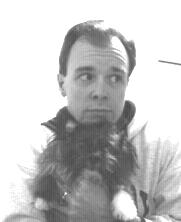|
|
|


"What gives humans access to the symbolic domain
of value and meaning is the fact that we die." -Regis de Bray
Last update: 06/21/00
![]()
![]() This page is under continuous construction.
This page is under continuous construction.
This page has been accessed times.
If you would like to read a brief tutorial on psychopharmacology (clinically-oriented), click here. I originally wrote it for medical students, but it should be understandable by anyone who is familiar with the concept of drug-receptor interactions (I hope). Also, for a Powerpoint slide show on the same subject click here.
I strongly recommend The Whole Brain Atlas for anyone who would like to get a look at some nice examples of structural and functional imaging studies of stroke, Alzheimer's disease and tumors.
Small application for calculation first-order kinetics
fractal.exe for displaying fractal and related sets
(Screen-savers are tricky programming, and later when I have time I'll create a page that explains how you can write your own screen-saver module. (It's hard to find in the books; I've only found useful descriptions in the Murray and Pappas book, and one in an advanced book on Windows programming by Schildt.) For now, I'm providing a 16-bit module (also works with Win95) that draws some stunning random patterns, very rapidly, based upon an algorithm by Barry Martin at Ashton University. Key points: download the file "martin.exe," then rename it "martin.scr" and copy it to your "Windows" directory. (Netscape doesn't like to download files with the suffix ".scr"; it will try to read them instead.) Once you've copied it to the "Windows" directory, you will then be able to pick MARTIN or MARTIN FUNCTION (depending on whether you're running Win3.1 or Win95) as an option from the menu of screensaver modules that you will find in the Display Properties dialog box of your Control Panel.)
For those of you who are interested in doing some Windows programming , let me just mention that if you've programmed for DOS, but have never done Windows before, it's really a lot easier than you think. I plan to do a brief intro on the subject for beginners later on. For now, I'll suggest two very good books that I have been using - one is that old standby, "Programming Windows," by Charles Petzold, available in several editions, including one now for Win95; the other is "Windows 95 Programming Nuts and Bolts for Experienced Programmers," by Herbert Schildt. The Schildt book is very lean and tight in it's organization and will quickly jump-start you if you want to get started writing programs right away. I have also been using a book that is slightly more advanced (I wouldn't recommend it as a first book for an aspiring Windows programmer) and really very good, and that is "Cross-Platform Programming for Windows," by William Murray and Chris Pappas. That one contains a sections on animation and screen-savers with examples for 3.1, 95 and NT. It also demonstrates how to use some of the simpler multimedia functions (such as BOOL sndPlaySound(lpszSoundName, wFlags) ).
Click here to see my CV/resume. I currently have a position with a university, but I'd be interested in any opportunities that could include medical software development or telemedicine.
I'd like to give credit to The Web-Counter for kindly providing access counter service; visit them by clicking on their link and get your own free page access counter without having to hassle with cgi scripts (which many ISP's won't let you use).
Well, that's as good as it gets!
jfoust@musc.edu P.S.: Don't forget to check out the Java/HotJava pages at